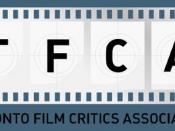What is the crisis in film criticism?
This short essay will examine the critic and his role in 20th century film criticism through analyzing various writings and essays. In J. Hoberman's essay "The Film Critic of Tomorrow, Today," the author raises several intriguing questions about film critics. Specifically he asks, what function today's critic plays in writing about film. By extension, what is the relation between film critics and films? Is the function of a film critic to uncover the hidden meaning of a film and to relay the meaning to an uninitiated audience? Must the review provided by the critic merely describe a filmic event or can writings about the film produce events themselves? Is there a need to revisit historical filmic methodologies in an effort to trace the recent move away from so-called film criticism in the 20th century? Hoberman argues that current film critics have become part of the vast machine devoted to commercial and communal taste, feeling, and desires which has led 20th century critics to publish a "John Doe" commodified critique, when the main objective is to sell the film.
Film criticism is the analysis and evaluation of films and as a rule can be divided into two broad areas, academic criticism by film scholars and journalistic film criticism that appears regularly in newspapers and magazines. In the past couple of years the film critic, his authority and his ability to analyze films have come under close scrutiny. In Maurice Berger's "The Crisis of Criticism," the author addresses the problematic nature of the film critic's authority. Berger feels that film criticism today is primarily descriptive, anecdotal and subjectively evaluative rather than analytical. Today's film critics have to review every piece of commercial trash that Hollywood, though not exclusively, throws up into their laps every...


